广东省深圳市 Module 4 Unit 8 Collecting things Reading 课件 (2)
文档属性
| 名称 | 广东省深圳市 Module 4 Unit 8 Collecting things Reading 课件 (2) | 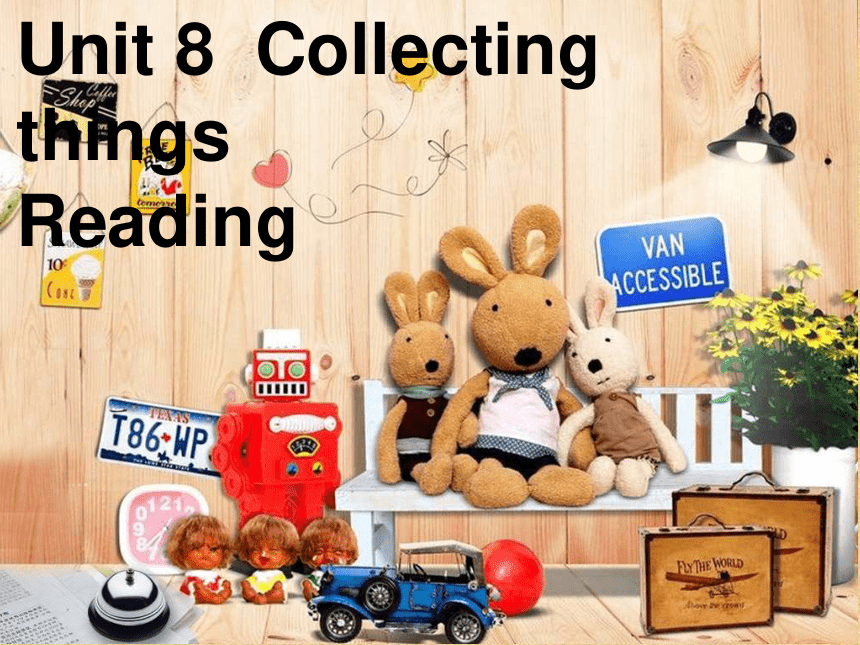 | |
| 格式 | zip | ||
| 文件大小 | 1.8MB | ||
| 资源类型 | 教案 | ||
| 版本资源 | 牛津深圳版 | ||
| 科目 | 英语 | ||
| 更新时间 | 2016-12-13 00:00:00 | ||
图片预览

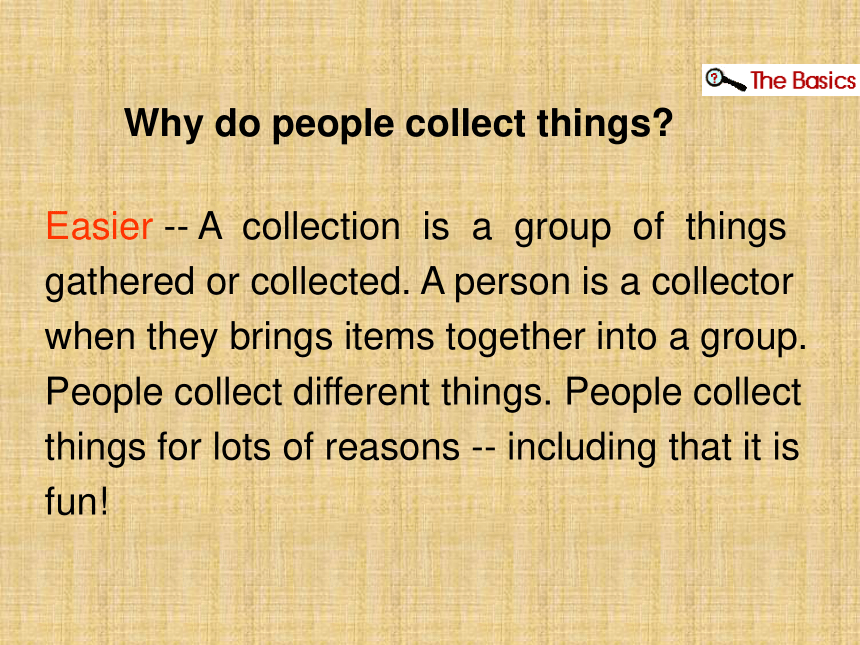
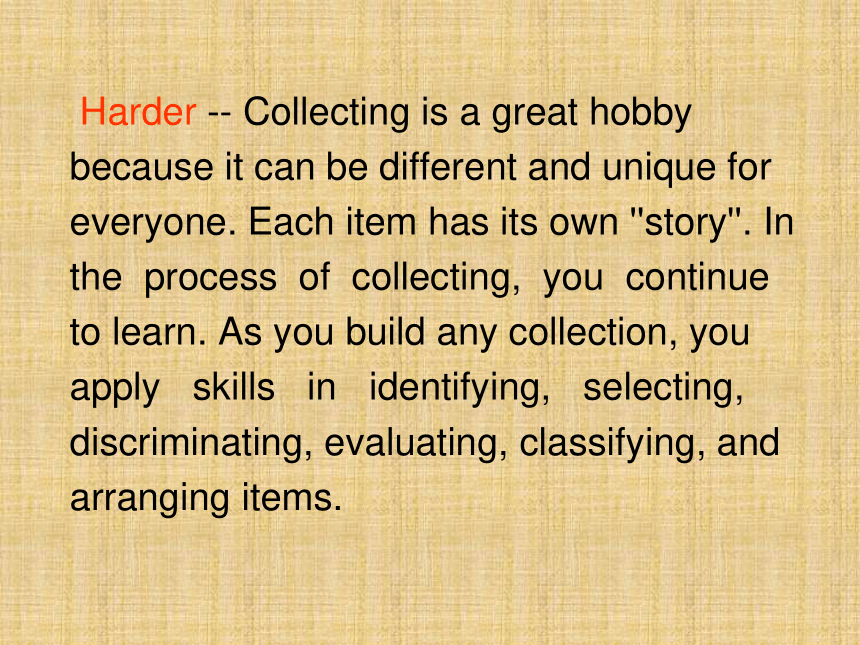

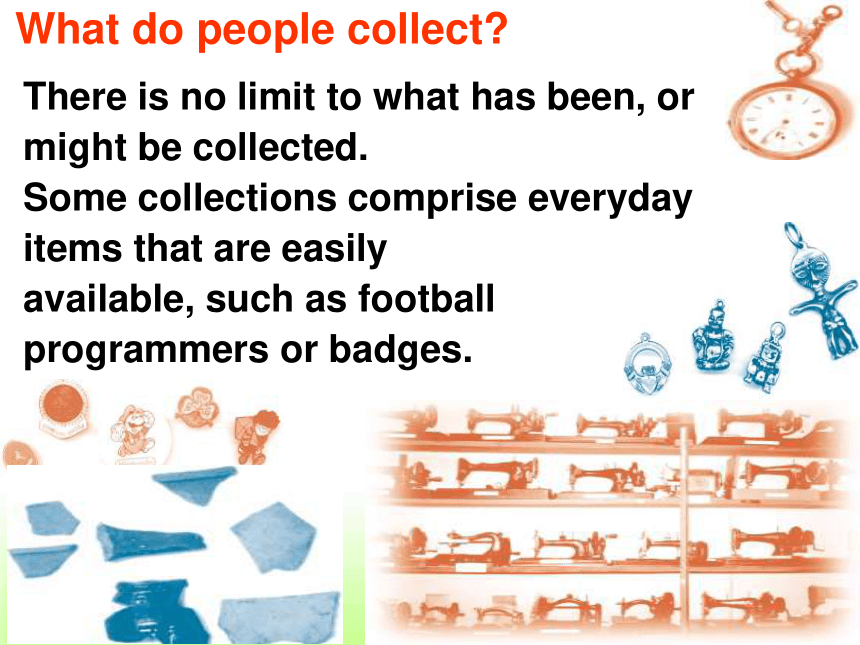
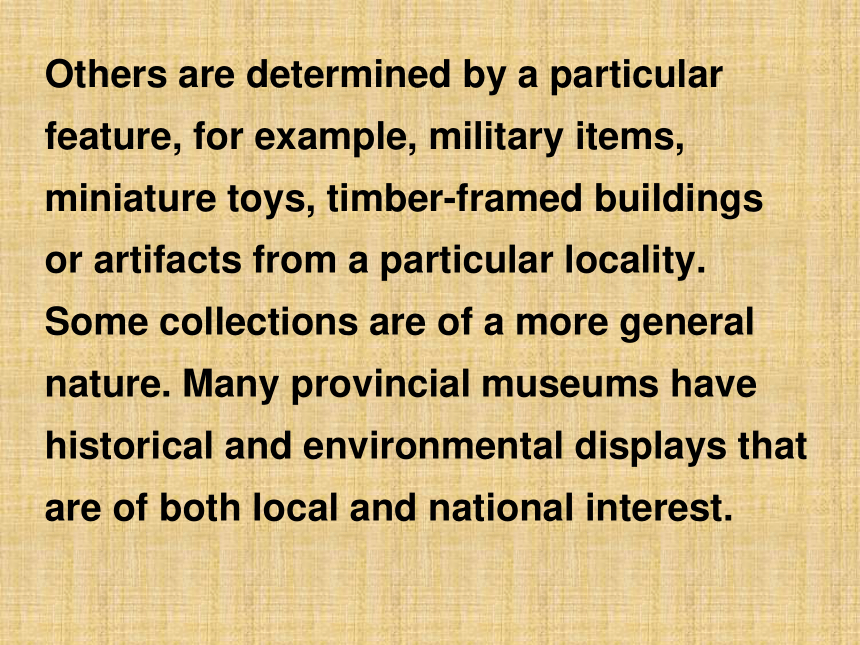
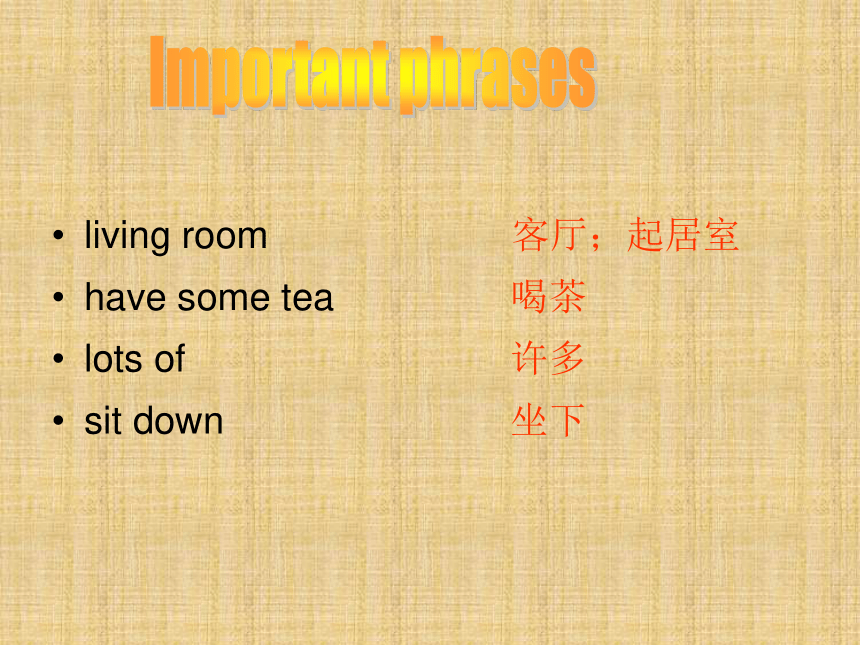
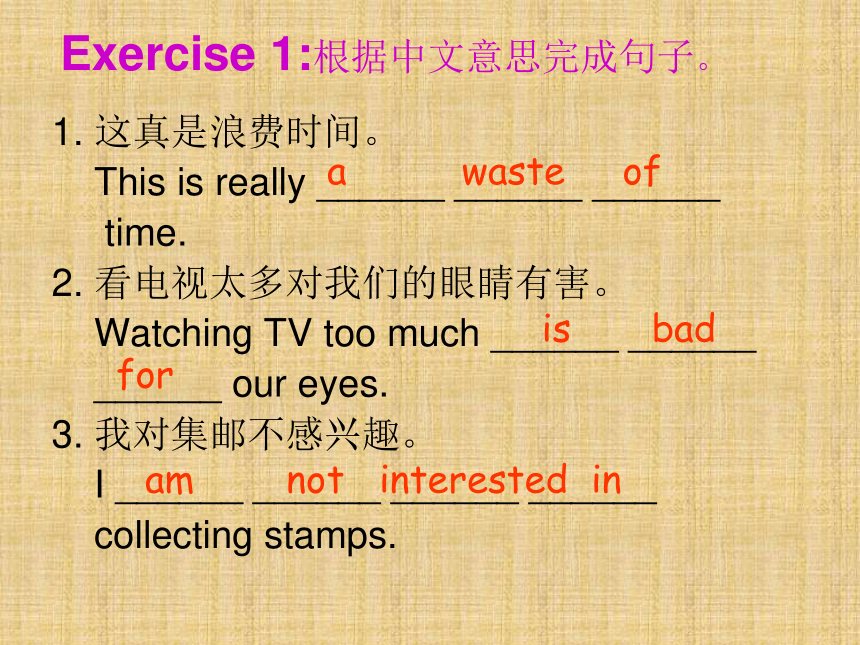

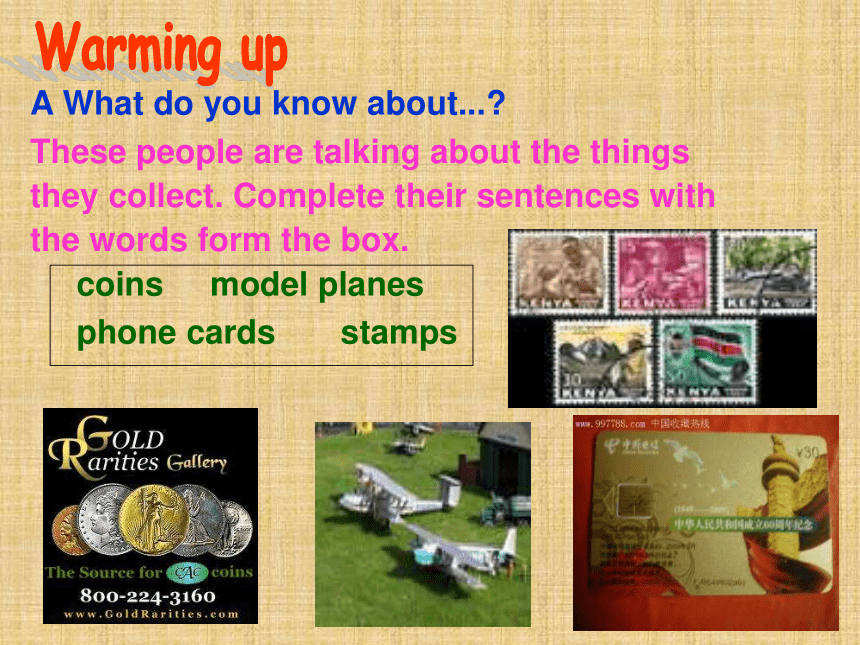
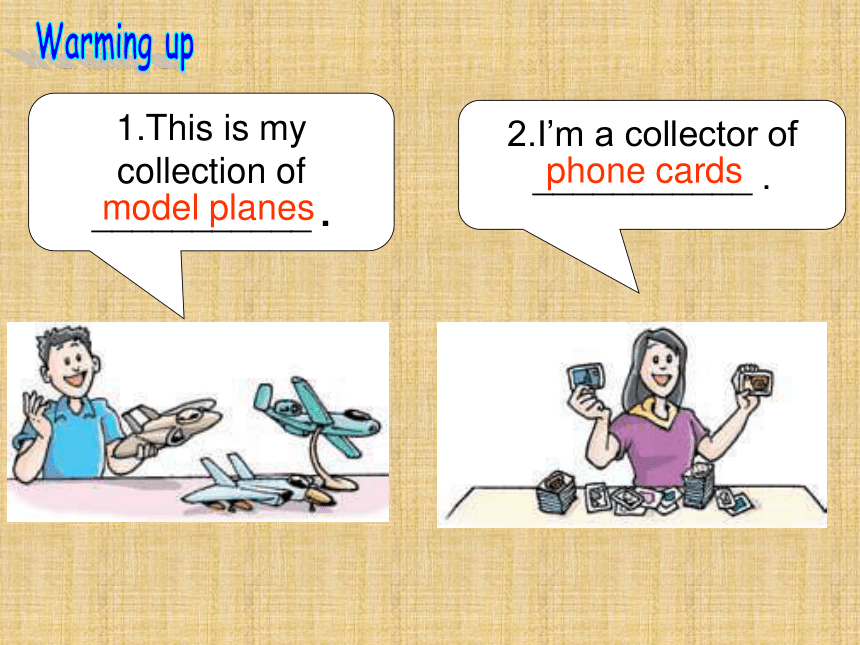
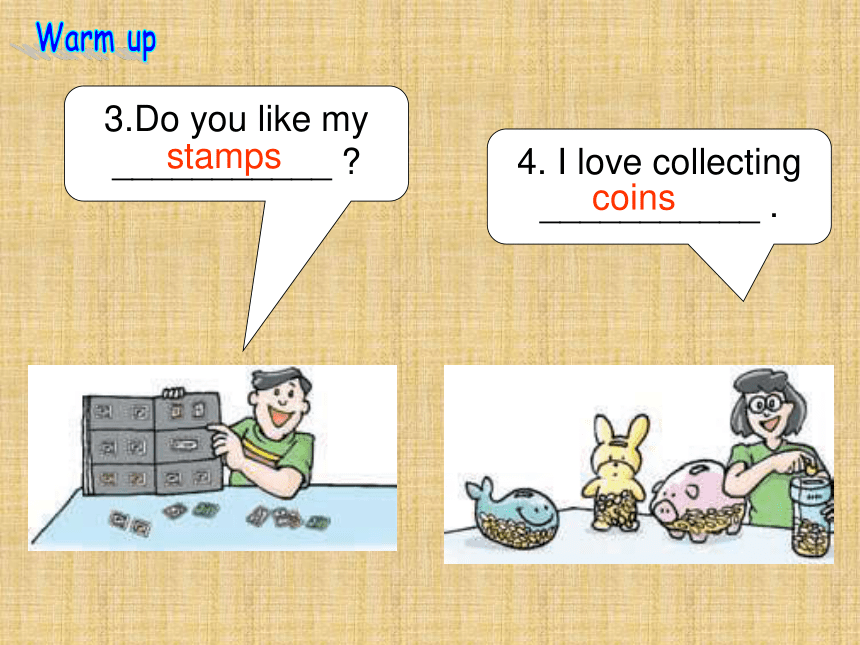
文档简介
课件37张PPT。Unit 8 Collecting things
Reading Why do people collect things?Easier -- A collection is a group of things gathered or collected. A person is a collector when they brings items together into a group. People collect different things. People collect things for lots of reasons -- including that it is fun!
Harder -- Collecting is a great hobby because it can be different and unique for everyone. Each item has its own ''story''. In the process of collecting, you continue to learn. As you build any collection, you apply skills in identifying, selecting, discriminating, evaluating, classifying, and arranging items.
Those who view collecting as trivial or a
waste of time, miss the connections that it
has to life skills and occupations. Scientists
also collect things. They gather information,
data, and samples. Museums and libraries
are collections. Many people make their
livelihoods by collecting and disposing items.
In fact, all of us go through our lives
collecting and discarding things around us.What do people collect?There is no limit to what has been, or might be collected.
Some collections comprise everyday items that are easily
available, such as football programmers or badges. Others are determined by a particular
feature, for example, military items,
miniature toys, timber-framed buildings
or artifacts from a particular locality.
Some collections are of a more general
nature. Many provincial museums have
historical and environmental displays that
are of both local and national interest.
living room
have some tea
lots of
sit down
Important phrases客厅;起居室
喝茶
许多
坐下
Exercise 1:根据中文意思完成句子。1. 这真是浪费时间。
This is really ______ ______ ______
time.
2. 看电视太多对我们的眼睛有害。
Watching TV too much ______ ______
______ our eyes.
3. 我对集邮不感兴趣。
I ______ ______ ______ ______
collecting stamps.a waste of is bad
foram not interested inExercise 2:从方框中选择合适的短语完 成句子,注意其形式。 living room, lots of, sit down
1. ___________ children go back to their
home towns to spend the summer
holiday.
2. People usually meet their guests in the
____________.
3. -- May I ___________?
-- Yes, of course.Lots ofliving roomsit downA What do you know about...?
These people are talking about the things they collect. Complete their sentences with the words form the box. coins model planes
phone cards stampsWarming upWarming up1.This is my collection of ___________ .2.I’m a collector of ___________ .model planesphone cardsWarm up3.Do you like my
___________ ?4. I love collecting
___________ .stamps coinsPre-readingB Before you read Look at the picture and the title of the story on page 101 . Then make a list of the things that the grandparents have collected. _________________________________
_________________________________newspapers, toys (cars, trains, ships, bears), shells,butterflies, glasses, bottles, etc. C Vocabulary C1 Find words from the story on page 101 that have similar meanings to the phrases in italics below.1 My friend will come to visit me in a short time from
now. (line 4)_________
2 There are tall buildings all over this area. (line 10) _________
3 I walked behind my grandma to the kitchen. (line 12) ________
4 I can almost not keep my eyes open. (line 13) __________
5 What do you do when you are not busy? (line 16) __________While-reading---------The 1st ReadingsooneverywherefollowedhardlyfreeSam: Do you collect anything?
Jack: Yes, I spend some of my (1)_______
time collecting toy cars.
Sam: How many toy cars do you have? C2 Sam and his friend Jack are talking about collecting things. Complete their conversation with the words from the box. everywhere follow free hardly inside freeWhile-reading---------The 2nd ReadingJack: Thirty. You can see them almost
(2)_________ in my room. There is
(3)__________ any space for more cars.
I have a very old one. I keep it safe
(4)__________ a box.
Sam: Can I see your cars now?
Jack: Yes. (5) _________ me and I’ll show
you.
everywherehardlyinsideFollowD Comprehension D1 Who/What do you words in italics refer to? Read the story on page 101 and circle the correct answers. She pushed it and soon Grandpa opened
the door. (lines 3-4)
a the silver doorbell b the door
They went inside and saw newspapers everywhere. (line 10)
a Sam and Helen
b Grandpa and GrandmaThe 2nd ReadingUnderstanding personal pronouns.aa3 They’re ours. (line 15)
a The newspapers
b The toys
4 We have a lot of free time! (line16)
a Grandpa and Grandma
b Sam and Helen
baD2 Helen is talking to her friend Sue. Help Helen answer the questions in complete sentences.1 Sue: Where did you and Sam go today?
Helen: _____________________________________
2 Sue: What do your grandparents do in their free time?
Helen: _____________________________________
3 Sue: What do they collect?
Helen: _____________________________________We went to our grandparents’ home today.They collect things in their free time.They collect doorbells, newspapers, toys and many other things.The 3rd ReadingD3 What advice did Grandpa give Sam and Helen about collecting? Do you agree? Give your reasons. Grandpa: But remember, we have a lot of free time! You have your school work to do, so you shouldn’t spend too much time collecting things! --Do you agree with Grandpa?Post- readingFree Talk--Yes, I agree./No, I don’t agree. Because_____________________Unusual collections Sam and Helen’s grandparents collect almost
everything. There are eight doorbells on their
front door!
“This silver doorbell is my favourite,” said Helen.
She pushed it and soon Grandpa opened the
door.
“Come in, my dear grandson and granddaughter!”
he said.
“Who started collecting doorbells, Grandpa?”
asked Sam.Post- readingRead loudly“Your grandma,” he answered. “She loves
doorbells.”
“What do you like collecting, Grandpa?”
asked Helen.
“I like collecting newspapers.”
They went inside and saw newspapers
everywhere.
“Hello children!” called Grandma. “Let’s have
some tea.”
The children followed her into the living room
and saw lots of toys there. There was hardly
any space for the children to sit down.
“Whose toys are these?” asked Helen.
“They’re ours,” said Grandma. “We both like
collecting toys .”
“But remember,” said Grandma, “We have a
lot of free time! You have your school work to
do, so you shouldn’t spend too much time
collecting things!” Post- readingLet’s find out the language points:1. Read a story about people who collect
unusual things.(P99)
unusual adj.
1)罕有的, 异乎寻常的 ;
2)?独特的, 与众不同的。
例如:这种鸟很少在冬季到英国来。
This bird is an unusual winter visitor
to Britain. 2. There are eight doorbells on their front
door!(P101)
front adj. 前面的 n.正面;前面;前线
in front of ?在 ... 前面。例如:
明信片的正面是我们旅馆的图片。
The front of the postcard shows a picture of
our hotel.
3. She pushed it and soon Grandpa opened
the door.(P101)
push v.按;揿;摁
n.推;进攻;矢志的追求;鼓励
词形变化: pushed;pushed;pushing;pushes
push off ?推迟
1) 小男孩把门推开了。
The little boy pushed the door open.
2) 吉普车太重,他推不动。
The jeep is too heavy for him to push.4. I like collecting newspapers.(101)
newspaper? n. 报纸
复数形式:newspapers 例如:
1) 他展开报纸开始阅读。
He unfurled the newspaper and began to
read.
2) 我爷爷有各种报纸。
My grandpa has all kinds of newspapers.5. They went inside and saw newspapers
everywhere.(101)
inside adv. 向里面
everywhere通常用作副词,其之前不需要用 in, at,
to之类的介词。例如:
他无论到哪儿都带着他的狗。
He takes his dog with him everywhere.
【注】everything可与介词 from 连用。例如:
祝贺像潮水一样从四面八方涌来。
Congratulations poured in from everywhere. 6. The children followed her into the living
room and saw lots of toys there. (101)
follow v. 跟随;跟着
词形变化: followed;followed;following;follows
例如:
1) 沿着河你就会走到海边。
Follow the river and you will get to the sea.
2) 提出忠告易,照著办事难。
It is easier to give good counsel than to
follow it. spend的用法
在使用spend时, 主语只能是表示人的名词或代词。例如:
Andy spent a lot of money on books.
安迪花了很多钱买书。
2. 若表示 “在......上花费(时间、金钱等)”,常用句型spend some money/ some time on sth,介词on之后接名词或代词。例如:
Kitty spends two hours on her homework
every day.
凯蒂每天花两个小时做家庭作业。 3. 若表示 “花费(时间、金钱等)做某事”,则常用句型spend some money / some time (in) doing sth, 此时第二个动词要用动词ing形式,介词in可以省略。例如:
They spent 4450 yuan (in) buying the big colour
TV set. 他们花了4450元买那台大彩电。
另外,spend也有 “度过”的意思。例如:
They want to spend their summer holiday
in the country.他们想去乡下过暑假。相关近义词比较:take, cost, spend
从句型结构来看。三者常用的句型为:
1. sth cost (sb) money 某物花了某人多少钱
2. sb spend time (money) on sth
某人在某一方面花了多少钱
3. sb spend time (money) (in) doing sth
某人花了多少钱做某事
4. it takes sb time (money) to do sth = it takes time
(money) for sb to do sth 做某事花了某人多少时间或钱
5. sth take sb time (money) to do
某事花了某人多少时间或钱去做
6. sb take time (money) to do
某人花了多少时间或钱去做某事Exercise 1: 根据中文意思完成句子。1.这种鸟很少冬季到英国来。
This bird is an ______ winter visitor to Britain.
2.明信片的正面是我们旅馆的图片。
The ________ of the postcard shows a
picture of our hotel.
3.小男孩把门推开了。
The little boy ________ the door open.
4.吉普车太重,他推不动。
They jeep is too heavy for him to_______.unusualfrontpushedpush5.他展开报纸开始阅读。
He unfurled the _________ and began to read.
6.我爷爷有各种报纸。
My grandpa has all kinds of __________.
7.我到处都找过它了。
I looked _________ for it.
8.祝贺像潮水一样从四面八方涌来。
Congratulations poured in _________
everywhere. newspapernewspaperseverywhere fromExercise 2: 根据句意,用括号内所给单词的正确形式填空。1. It’s ________(usual) that the old man
keeps snakes at home.
2. My mother is a magazine ________ (collect). She has different kinds of magazines at home.
3. There are some beautiful flowers on the
table in my _________(live) room.unusualcollectorlivingExercise 3: 根据中文意思完成句子。1. 我每天花一个小时的时间拉小提琴。
I ______ an hour ______ the violin
every day.
2. 我跟着我的老师进了学校图书馆。
I ______ my teacher ______ the school
library.
3. 彼得非常喜欢打篮球。
Peter ______ ______ basketball
very much.spend playingfollowed intolikes playing4. 我的爷爷和奶奶都喜欢晨练。
_______ of my grandparents like
_______ morning exercises.
5. 我的房间很小,几乎没有什么空间放下一台钢琴。
My room is very small. There is ______ ______ ______ for a piano.Both
doing hardly
any space
Reading Why do people collect things?Easier -- A collection is a group of things gathered or collected. A person is a collector when they brings items together into a group. People collect different things. People collect things for lots of reasons -- including that it is fun!
Harder -- Collecting is a great hobby because it can be different and unique for everyone. Each item has its own ''story''. In the process of collecting, you continue to learn. As you build any collection, you apply skills in identifying, selecting, discriminating, evaluating, classifying, and arranging items.
Those who view collecting as trivial or a
waste of time, miss the connections that it
has to life skills and occupations. Scientists
also collect things. They gather information,
data, and samples. Museums and libraries
are collections. Many people make their
livelihoods by collecting and disposing items.
In fact, all of us go through our lives
collecting and discarding things around us.What do people collect?There is no limit to what has been, or might be collected.
Some collections comprise everyday items that are easily
available, such as football programmers or badges. Others are determined by a particular
feature, for example, military items,
miniature toys, timber-framed buildings
or artifacts from a particular locality.
Some collections are of a more general
nature. Many provincial museums have
historical and environmental displays that
are of both local and national interest.
living room
have some tea
lots of
sit down
Important phrases客厅;起居室
喝茶
许多
坐下
Exercise 1:根据中文意思完成句子。1. 这真是浪费时间。
This is really ______ ______ ______
time.
2. 看电视太多对我们的眼睛有害。
Watching TV too much ______ ______
______ our eyes.
3. 我对集邮不感兴趣。
I ______ ______ ______ ______
collecting stamps.a waste of is bad
foram not interested inExercise 2:从方框中选择合适的短语完 成句子,注意其形式。 living room, lots of, sit down
1. ___________ children go back to their
home towns to spend the summer
holiday.
2. People usually meet their guests in the
____________.
3. -- May I ___________?
-- Yes, of course.Lots ofliving roomsit downA What do you know about...?
These people are talking about the things they collect. Complete their sentences with the words form the box. coins model planes
phone cards stampsWarming upWarming up1.This is my collection of ___________ .2.I’m a collector of ___________ .model planesphone cardsWarm up3.Do you like my
___________ ?4. I love collecting
___________ .stamps coinsPre-readingB Before you read Look at the picture and the title of the story on page 101 . Then make a list of the things that the grandparents have collected. _________________________________
_________________________________newspapers, toys (cars, trains, ships, bears), shells,butterflies, glasses, bottles, etc. C Vocabulary C1 Find words from the story on page 101 that have similar meanings to the phrases in italics below.1 My friend will come to visit me in a short time from
now. (line 4)_________
2 There are tall buildings all over this area. (line 10) _________
3 I walked behind my grandma to the kitchen. (line 12) ________
4 I can almost not keep my eyes open. (line 13) __________
5 What do you do when you are not busy? (line 16) __________While-reading---------The 1st ReadingsooneverywherefollowedhardlyfreeSam: Do you collect anything?
Jack: Yes, I spend some of my (1)_______
time collecting toy cars.
Sam: How many toy cars do you have? C2 Sam and his friend Jack are talking about collecting things. Complete their conversation with the words from the box. everywhere follow free hardly inside freeWhile-reading---------The 2nd ReadingJack: Thirty. You can see them almost
(2)_________ in my room. There is
(3)__________ any space for more cars.
I have a very old one. I keep it safe
(4)__________ a box.
Sam: Can I see your cars now?
Jack: Yes. (5) _________ me and I’ll show
you.
everywherehardlyinsideFollowD Comprehension D1 Who/What do you words in italics refer to? Read the story on page 101 and circle the correct answers. She pushed it and soon Grandpa opened
the door. (lines 3-4)
a the silver doorbell b the door
They went inside and saw newspapers everywhere. (line 10)
a Sam and Helen
b Grandpa and GrandmaThe 2nd ReadingUnderstanding personal pronouns.aa3 They’re ours. (line 15)
a The newspapers
b The toys
4 We have a lot of free time! (line16)
a Grandpa and Grandma
b Sam and Helen
baD2 Helen is talking to her friend Sue. Help Helen answer the questions in complete sentences.1 Sue: Where did you and Sam go today?
Helen: _____________________________________
2 Sue: What do your grandparents do in their free time?
Helen: _____________________________________
3 Sue: What do they collect?
Helen: _____________________________________We went to our grandparents’ home today.They collect things in their free time.They collect doorbells, newspapers, toys and many other things.The 3rd ReadingD3 What advice did Grandpa give Sam and Helen about collecting? Do you agree? Give your reasons. Grandpa: But remember, we have a lot of free time! You have your school work to do, so you shouldn’t spend too much time collecting things! --Do you agree with Grandpa?Post- readingFree Talk--Yes, I agree./No, I don’t agree. Because_____________________Unusual collections Sam and Helen’s grandparents collect almost
everything. There are eight doorbells on their
front door!
“This silver doorbell is my favourite,” said Helen.
She pushed it and soon Grandpa opened the
door.
“Come in, my dear grandson and granddaughter!”
he said.
“Who started collecting doorbells, Grandpa?”
asked Sam.Post- readingRead loudly“Your grandma,” he answered. “She loves
doorbells.”
“What do you like collecting, Grandpa?”
asked Helen.
“I like collecting newspapers.”
They went inside and saw newspapers
everywhere.
“Hello children!” called Grandma. “Let’s have
some tea.”
The children followed her into the living room
and saw lots of toys there. There was hardly
any space for the children to sit down.
“Whose toys are these?” asked Helen.
“They’re ours,” said Grandma. “We both like
collecting toys .”
“But remember,” said Grandma, “We have a
lot of free time! You have your school work to
do, so you shouldn’t spend too much time
collecting things!” Post- readingLet’s find out the language points:1. Read a story about people who collect
unusual things.(P99)
unusual adj.
1)罕有的, 异乎寻常的 ;
2)?独特的, 与众不同的。
例如:这种鸟很少在冬季到英国来。
This bird is an unusual winter visitor
to Britain. 2. There are eight doorbells on their front
door!(P101)
front adj. 前面的 n.正面;前面;前线
in front of ?在 ... 前面。例如:
明信片的正面是我们旅馆的图片。
The front of the postcard shows a picture of
our hotel.
3. She pushed it and soon Grandpa opened
the door.(P101)
push v.按;揿;摁
n.推;进攻;矢志的追求;鼓励
词形变化: pushed;pushed;pushing;pushes
push off ?推迟
1) 小男孩把门推开了。
The little boy pushed the door open.
2) 吉普车太重,他推不动。
The jeep is too heavy for him to push.4. I like collecting newspapers.(101)
newspaper? n. 报纸
复数形式:newspapers 例如:
1) 他展开报纸开始阅读。
He unfurled the newspaper and began to
read.
2) 我爷爷有各种报纸。
My grandpa has all kinds of newspapers.5. They went inside and saw newspapers
everywhere.(101)
inside adv. 向里面
everywhere通常用作副词,其之前不需要用 in, at,
to之类的介词。例如:
他无论到哪儿都带着他的狗。
He takes his dog with him everywhere.
【注】everything可与介词 from 连用。例如:
祝贺像潮水一样从四面八方涌来。
Congratulations poured in from everywhere. 6. The children followed her into the living
room and saw lots of toys there. (101)
follow v. 跟随;跟着
词形变化: followed;followed;following;follows
例如:
1) 沿着河你就会走到海边。
Follow the river and you will get to the sea.
2) 提出忠告易,照著办事难。
It is easier to give good counsel than to
follow it. spend的用法
在使用spend时, 主语只能是表示人的名词或代词。例如:
Andy spent a lot of money on books.
安迪花了很多钱买书。
2. 若表示 “在......上花费(时间、金钱等)”,常用句型spend some money/ some time on sth,介词on之后接名词或代词。例如:
Kitty spends two hours on her homework
every day.
凯蒂每天花两个小时做家庭作业。 3. 若表示 “花费(时间、金钱等)做某事”,则常用句型spend some money / some time (in) doing sth, 此时第二个动词要用动词ing形式,介词in可以省略。例如:
They spent 4450 yuan (in) buying the big colour
TV set. 他们花了4450元买那台大彩电。
另外,spend也有 “度过”的意思。例如:
They want to spend their summer holiday
in the country.他们想去乡下过暑假。相关近义词比较:take, cost, spend
从句型结构来看。三者常用的句型为:
1. sth cost (sb) money 某物花了某人多少钱
2. sb spend time (money) on sth
某人在某一方面花了多少钱
3. sb spend time (money) (in) doing sth
某人花了多少钱做某事
4. it takes sb time (money) to do sth = it takes time
(money) for sb to do sth 做某事花了某人多少时间或钱
5. sth take sb time (money) to do
某事花了某人多少时间或钱去做
6. sb take time (money) to do
某人花了多少时间或钱去做某事Exercise 1: 根据中文意思完成句子。1.这种鸟很少冬季到英国来。
This bird is an ______ winter visitor to Britain.
2.明信片的正面是我们旅馆的图片。
The ________ of the postcard shows a
picture of our hotel.
3.小男孩把门推开了。
The little boy ________ the door open.
4.吉普车太重,他推不动。
They jeep is too heavy for him to_______.unusualfrontpushedpush5.他展开报纸开始阅读。
He unfurled the _________ and began to read.
6.我爷爷有各种报纸。
My grandpa has all kinds of __________.
7.我到处都找过它了。
I looked _________ for it.
8.祝贺像潮水一样从四面八方涌来。
Congratulations poured in _________
everywhere. newspapernewspaperseverywhere fromExercise 2: 根据句意,用括号内所给单词的正确形式填空。1. It’s ________(usual) that the old man
keeps snakes at home.
2. My mother is a magazine ________ (collect). She has different kinds of magazines at home.
3. There are some beautiful flowers on the
table in my _________(live) room.unusualcollectorlivingExercise 3: 根据中文意思完成句子。1. 我每天花一个小时的时间拉小提琴。
I ______ an hour ______ the violin
every day.
2. 我跟着我的老师进了学校图书馆。
I ______ my teacher ______ the school
library.
3. 彼得非常喜欢打篮球。
Peter ______ ______ basketball
very much.spend playingfollowed intolikes playing4. 我的爷爷和奶奶都喜欢晨练。
_______ of my grandparents like
_______ morning exercises.
5. 我的房间很小,几乎没有什么空间放下一台钢琴。
My room is very small. There is ______ ______ ______ for a piano.Both
doing hardly
any space
